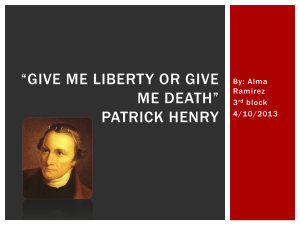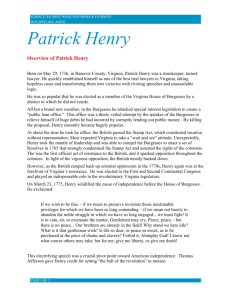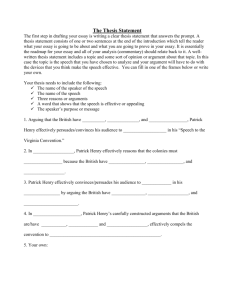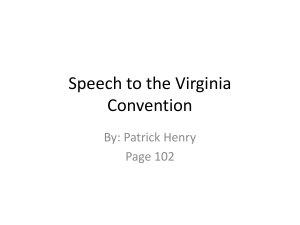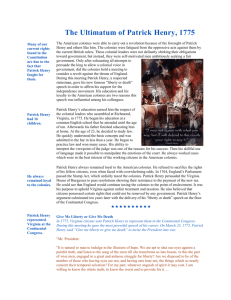What Patrick Henry Accomplished And What He Stood For
advertisement
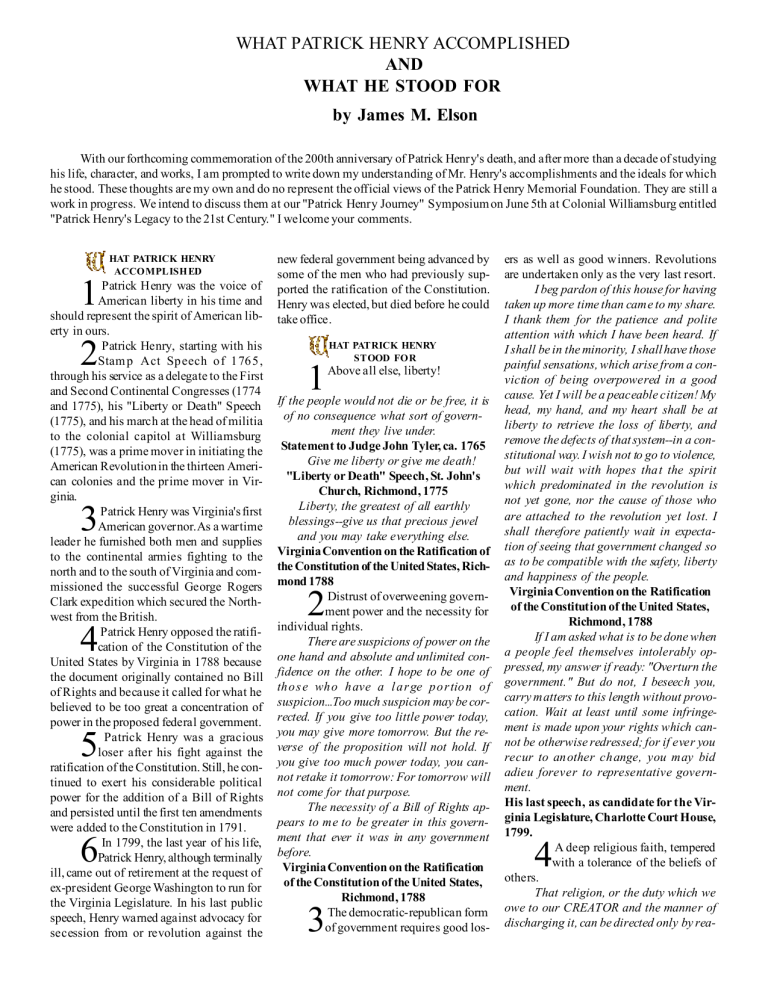
WHAT PATRICK HENRY ACCOMPLISHED AND WHAT HE STOOD FOR by James M. Elson With our forthcoming commemoration of the 200th anniversary of Patrick Henry's death, and after more than a decade of studying his life, character, and works, I am prompted to write down my understanding of Mr. Henry's accomplishments and the ideals for which he stood. These thoughts are my own and do no represent the official views of the Patrick Henry Memorial Foundation. They are still a work in progress. We intend to discuss them at our "Patrick Henry Journey" Symposium on June 5th at Colonial Williamsburg entitled "Patrick Henry's Legacy to the 21st Century." I welcome your comments. HAT PATRICK HENRY ACCOMPLISHED 1 Patrick Henry was the voice of American liberty in his time and should represent the spirit of American liberty in ours. Patrick Henry, starting with his Stam p Act Speech of 1765, through his service as a delegate to the First and Second Continental Congresses (1774 and 1775), his "Liberty or Death" Speech (1775), and his march at the head of militia to the colonial capitol at Williamsburg (1775), was a prime mover in initiating the American Revolution in the thirteen American colonies and the prime mover in Virginia. Patrick Henry was Virginia's first American governor. As a wartime leader he furnished both men and supplies to the continental armies fighting to the north and to the south of Virginia and commissioned the successful George Rogers Clark expedition which secured the Northwest from the British. Patrick Henry opposed the ratification of the Constitution of the United States by Virginia in 1788 because the document originally contained no Bill of Rights and because it called for what he believed to be too great a concentration of power in the proposed federal government. Patrick Henry was a gracious loser after his fight against the ratification of the Constitution. Still, he continued to exert his considerable political power for the addition of a Bill of Rights and persisted until the first ten amendments were added to the Constitution in 1791. In 1799, the last year of his life, Patrick Henry, although terminally ill, came out of retirement at the request of ex-president George Washington to run for the Virginia Legislature. In his last public speech, Henry warned against advocacy for secession from or revolution against the 2 3 4 5 6 new federal government being advanced by some of the men who had previously supported the ratification of the Constitution. Henry was elected, but died before he could take office. HAT PATRICK HENRY STOOD FOR 1 Above all else, liberty! If the people would not die or be free, it is of no consequence what sort of government they live under. Statement to Judge John Tyler, ca. 1765 Give me liberty or give me death! "Liberty or Death" Speech, St. John's Church, Richmond, 1775 Liberty, the greatest of all earthly blessings--give us that precious jewel and you may take everything else. Virginia Convention on the Ratification of the Constitution of the United States, Richmond 1788 Distrust of overweening government power and the necessity for individual rights. There are suspicions of power on the one hand and absolute and unlimited confidence on the other. I hope to be one of thos e who have a l ar ge por tion of suspicion...Too much suspicion may be corrected. If you give too little power today, you may give more tomorrow. But the reverse of the proposition will not hold. If you give too much power today, you cannot retake it tomorrow: For tomorrow will not come for that purpose. The necessity of a Bill of Rights appears to me to be greater in this government that ever it was in any government before. Virginia Convention on the Ratification of the Constitution of the United States, Richmond, 1788 The democratic-republican form of government requires good los- 2 3 ers as well as good winners. Revolutions are undertaken only as the very last resort. I beg pardon of this house for having taken up more time than came to my share. I thank them for the patience and polite attention with which I have been heard. If I shall be in the minority, I shall have those painful sensations, which arise from a conviction of being overpowered in a good cause. Yet I will be a peaceable citizen! My head, my hand, and my heart shall be at liberty to retrieve the loss of liberty, and remove the defects of that system--in a constitutional way. I wish not to go to violence, but will wait with hopes that the spirit which predominated in the revolution is not yet gone, nor the cause of those who are attached to the revolution yet lost. I shall therefore patiently wait in expectation of seeing that government changed so as to be compatible with the safety, liberty and happiness of the people. Virginia Convention on the Ratification of the Constitution of the United States, Richmond, 1788 If I am asked what is to be done when a people feel themselves intolerably oppressed, my answer if ready: "Overturn the government." But do not, I beseech you, carry matters to this length without provocation. Wait at least until some infringement is made upon your rights which cannot be otherwise redressed; for if ever you recur to another change, you may bid adieu forever to representative government. His last speech, as candidate for the Virginia Legislature, Charlotte Court House, 1799. A deep religious faith, tempered with a tolerance of the beliefs of others. That religion, or the duty which we owe to our CREATOR and the manner of discharging it, can be directed only by rea- 4 son and conviction, not by force of violence, and therefore all ment are equally entitled to the free exercise of religion, according to the dictates of conscience; and that it is the mutual duty of all to practice Christian forbearance, love, and charity towards each other. Article 16 of the Virginia Declaration of Rights, adopted 12 June 1776, which, according to Edmund Randolph's History of Virginia, was proposed by Patrick Henry. Views on slavery and race at variance with those prevalent in his time and place, although Henry, like most Virginia plantation owners, was himself a slaveholder. Is it not amazing that at a time, when the rights of humanity are defined and understood with precision, in a country about all others, fond of liberty, that in such an age and in such a country, we find men professing a religion the most humane, mild, gentle and generous, adopting a principle [slavery] as repugnant to humanity, as it is inconsistent with the Bible and destructive to liberty?...Would anyone believe I am the master of slaves of my own purchase! I 5 am drawn along by the general inconvenience of living here without them. I will not, I cannot justify it. In a letter to Quaker leader Robert Pleasants, 1773 Whereas, intermarriage between the citizens of this commonwealth and the Indians living in its neighborhood may have great effect in conciliating the friendship and confidence of the latter, whereby not only their civilization may in some degree be finally brought about, but in the meantime their hostile inroads be prevented... Preamble to "A Bill for the Encouragement of Marriage with the Indians," introduced by Patrick Henry into the Virginia Legislature in 1784. The bill passed twice, but was rejected upon its final reading when Henry was removed from the legislature by his election of governor. A strong sense of patriotism and faith in America. The American Revolution was the grand operation, which seemed to be assigned by the Deity to the men of this age in our country, over and above the common duties of life. I ever prized the supe- 6 rior privilege of being one in that chosen age to which providence entrusted its favorite work. In a letter to Henry ("Light Horse Harry") Lee, 27 June 1795 Without virtue the blessings of liberty will be worth little. Whether this [American liberty] will prove a blessing or a curse will depend upon the use our people make of the blessings which a gracious God hath bestowed upon us. If they be wise, they will be great and happy. If they are of a contrary character, they will be miserable. Righteousness alone shall exalt them as a nation. Reader! whoever thou art, remember this, and in thy sphere practice virtue thyself, and encourage it in others. The concluding lines of a note found with his will after Patrick Henry's death in 1799 7 (James Elson is the Executive Vice President of the Patrick Henry Memorial Foundation at Red Hill, Virginia, Henry's ancestral home. The Woman's Auxiliary of the Foundation is the national sponsor of Oratory.)



